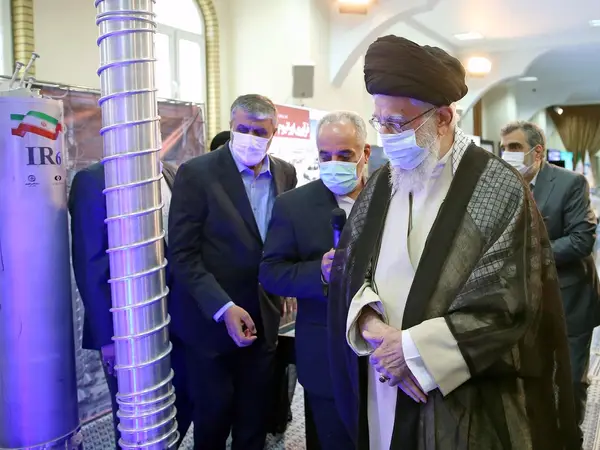A commentator in Iran questioned the president's ability to pursue nuclear negotiations as Supreme Leader Ali Khamenei again set the parameters for talks.
The 84-year-old authoritarian ruler told his top officials this week that a deal with the West on the nuclear issue can be accepted only if it does not adversely affect the country's nuclear infrastructure.
Mehdi Zakerian, an outspoken academic and a critic of Iran's policies on nuclear negotiations, reiterated in an interview with Rouydad24 that "the behavior of successive governments in Iran have no impact on foreign policy" as those policies are determined elsewhere, meaning by Khamenei. He had said the same the night before in a debate with hardliner academic Foad Izadi on live state TV.
Meanwhile, he added in the interview that people should not pay any attention to allusions about "beggars’ diplomacy." The only person who had used that expression in reference to the Rouhani administration's more pragmatic approach to nuclear negotiations was no one other than Khamenei.
Zakerian argued that key decisions in Iran are made on case-by-case basis, despite lofty statements, and sometimes it seems the government undermines its own previous decisions.
He said the government should acknowledge that the pressure of sanctions was the main reason why the Islamic Republic succumbed to a nuclear deal in the first place. He had said on TV that it was Iran's behavior that led former US President Donald Trump to withdraw from the JCPOA.
Zakerian made it clear that in the Iranian political structure major decisions are always made by Khamenei, and no Iranian official is entitled to make any decision or statement on his own on important issues.
He added that public opinion in Iran has a limited impact which was most clearly observed during the presidential elections in 2013 and 2017. Having elected the more pragmatic Hassan Rouhani, the outcome in the end was the same.
At the same time, referring to the country's difficult situation under President Ebrahim Raisi, conservative newspaper Jomhouri Eslami warned that Iran's political and economic situation is becoming increasingly similar to the last days of the Soviet Union where rich leaders had no idea what was happening to the poor nation.
The daily wrote in its editorial on Sunday that Iranian leaders should take a lesson from the fate of the Soviet Union, a system that had denied the people political freedom. The editorial pointed out the similarities between the Soviet Union that was founded based on the idea of equality but ended up being plagued by discriminations, and the Islamic Republic which was based on the idea of religion and social justice but created a social class of ‘nouveau riches’ managerial cadres. This new class, wrote the paper, undermines the constitution and benefits the insiders.
The daily warned that unlike North Korea, the people of Iran will not tolerate a closed system and a new social class of exceptionally and unjustifiably privileged minority who rule the nation.
Also speaking on the nuclear issue, lawmaker Jalil Rahimi Jahanabadi told Khabar Online that the hard-line lawmakers who set fire to copies of the 2015 nuclear deal in the previous parliament should be put on trial for what they did. Jahanabadi described them as "a loud minority that create all sorts of trouble for the nation." He further asked Iran's moderates: "Why don't you stand up against this minority?"
However, Jahanabadi failed to observe that although the opponents of the JCPOA comprise a minority in Iran, they hold most seats in parliament. However, he warned that "The nation has lost its patience while moderate politicians are silently hoping for a miracle…They left no future for us or for our children.”
